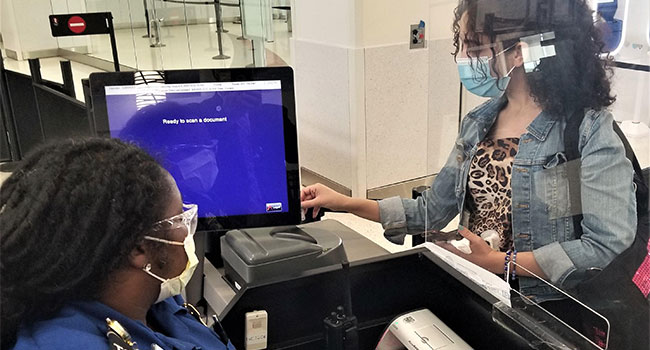
TSA at BWI and Tampa airports get new Credential Authentication Technology
Transportation Security Administration officers at Baltimore/Washington International-Thurgood Marshall Airport and Tampa International Airport are now using new technology that confirms the validity of a traveler’s identification (ID) and confirms their flight information in near real time.
TSA has 14 Credential Authentication Technology units at BWI and and nine at TPA in use at the airports.
“The Credential Authentication Technology (CAT) units improve upon TSA’s capabilities to detect fraudulent ID such as driver’s licenses and passports at checkpoints and increases efficiency by automatically verifying passenger identification,” said Andrea R. Mishoe, TSA’s Federal Security Director for Maryland. “The CAT system is able to confirm a passenger’s flight status in near real time, adding to the efficiency of the process.”
A CAT unit reads a driver’s license that was inserted into the unit and indicates that this license has expired and is no longer valid for passage through the checkpoint.
When travelers approach the TSA travel document podium, they place their driver’s license or passport into the CAT unit to be scanned. Because the passenger inserts their ID instead of handing it to a TSA officer, it is one less touch-point to help fight the spread of the coronavirus.
In most cases, travelers who approach the TSA travel document checking podium do not have to show their boarding pass because the CAT unit verifies that the traveler is prescreened to travel out of the airport for a flight that day; however, one may be requested for travelers under the age of 18 and/or those with ID issues. Even with TSA’s use of CAT, travelers still need to check-in with their airline in advance and bring their boarding pass to their gate agent to show the airline representative before boarding their flight.
This technology will enhance detection capabilities for identifying fraudulent documents at the security checkpoint.
CAT units authenticate several thousand types of IDs including passports, military common access cards, retired military ID cards, Department of Homeland Security Trusted Traveler ID cards, uniformed services ID cards, permanent resident cards, U.S. visas and driver licenses and photo IDs issued by state motor vehicle departments.
A CAT unit consists of the passport reader, an ID card reader, staff identity verification ID card reader, a monitor, a stand and a UV light.
In addition, it is critical that travelers have their REAL ID-compliant driver’s licenses or other acceptable form of identification by the Oct. 1, 2021, deadline. The CAT units will not accept a driver’s license after Oct. 1, 2021, if it is not REAL ID-compliant.
Passed by Congress in 2005, the REAL ID Act enacted the 9/11 Commission's recommendation that the federal government “set standards for the issuance of sources of identification, such as driver's licenses.” The Act and implementing regulations establishes minimum security standards for state-issued driver's licenses and identification cards and prohibits federal agencies, like TSA, from accepting driver’s licenses and identification cards from states that do not meet these standards for official purposes, such as getting through the airport security checkpoint to board a plane.